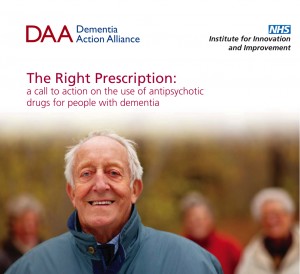Improving the prescribing of antipsychotic drugs for people with dementia
The NHS Institute for Innovation and Improvement and the Dementia Action Alliance have launched a call to action to work together to improve the quality of life of people with dementia and their carers by reducing the inappropriate use of antipsychotics for these people.
- Download The Right Prescription: a call to action on the use of antipsychotic drugs for people with dementia
A specific commitment has been developed for eights groups to enable everyone to play their part to achieve the overall goal.
- People with dementia and their carers & voluntary sector and advocacy groups (local and national)
- Leaders of care homes
- General Practitioners and primary care teams
- Psychiatrists and mental health teams
- Pharmacists
- Hospital doctors and multidisciplinary teams
- Commissioners of health and social care services
- Medical and nursing directors of acute and foundation trusts
Useful resources
- Summary of the commitments
- Commitment drivers
- Mason. J. (2011) Time to reduce improper use of antipsychotics in people with dementia The Pharmaceutical Journal 2011; 286:719
- The Alzheimer’s Society is creating a best practice guidance which is currently available for consultation for interested parties to review and comment on.
In February 2011, Sir Ian Carruthers, Chief Executive of NHS South West and Jeremy Hughes, Chief Executive of the Alzheimer’s Society, wrote to SHA Chief Executives to invite them to adapt four recommendations to drive down inappropriate prescribing antipsychotic medication and providing alternative ways of working and interventions that improve the safety, quality of life and outcomes for people with dementia.
- Download the letter (MS Word 124 KB)
- Download a briefing paper outlining questions that people might want to ask about progress in a locality on reducing inappropriate prescribing of antipsychotic medication (MS Word 32 KB)
The recommendations include:
- For 2011-12, all localities (PCTs or clusters depending on your local arrangements) undertake local audits of current practice on antipsychotic prescribing for people with dementia in four areas:
1. prescribing by acute and community hospital doctors
2. prescribing by psychiatrists
3. prescribing by general practitioners
4. prescribing in care homes - To increase local accountability for prioritisation, SHAs ensure that PCTs meet the requirement in the Revision to Operating Framework for 2010-11 to publish their progress on implementing the National Dementia Strategy.
- Jim Easton, the National Director for Improvement and Efficiency has asked the NHS Institute for Innovation and Improvement to support and enable a campaign style approach to reducing inappropriate prescribing of antipsychotic medication as part of the QIPP work stream on “mobilising and organising”. This work will involve mobilising everyone who has a contribution to make, to take action to achieve this goal.
- SHAs consider regional CQUIN schemes that focus on reducing inappropriate antipsychotic prescribing in dementia.
In December 2010, Sir Ian Carruthers, Chief Executive of NHS South West and Jeremy Hughes, Chief Executive of the Alzheimer’s Society wrote to SHA Chief Executives to invite their participation in work to accelerate improvements in local practice in prescribing antipsychotic drugs for people with dementia, which will be funded by the Department of Health.
- Download the letter (MS Word 128 KB)
The government has recently committed to achieving an overall two-thirds reduction in the use of antipsychotic medication by November 2011. The Department of Health has commissioned a national audit to measure progress at a national level, which is being undertaken by the NHS Information Centre. The audit will deliver its first results in Spring 2011.
The letter states that it is important that the over-prescribing of antipsychotic medication is tackled as part of whole-system change to deliver quality outcomes for people with dementia and their carers and that the issue is not seen in isolation. It is crucial that work on improving prescribing progresses in conjunction with improving the design of services for people with dementia and their carers, especially early diagnosis and intervention, and support in managing challenging behaviours.

